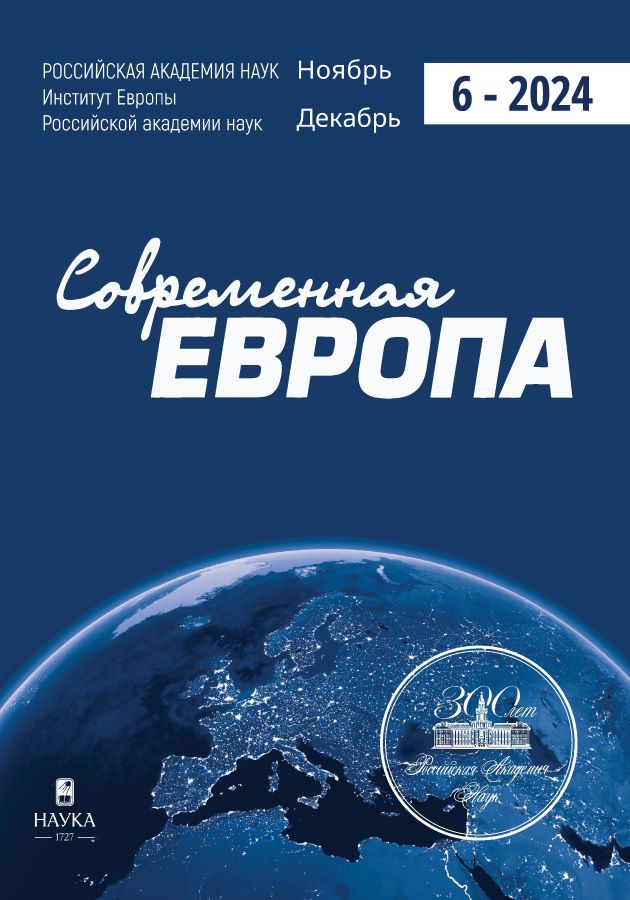Factors of Ontological Security and their Impact on Foreign Policy of Serbia and Türkiye
- Autores: Efremenko D.V1, Rastegaev D.O1
-
Afiliações:
- Institute of Scientific Information on Social Sciences (INION RAS)
- Edição: Nº 6 (127) (2024)
- Páginas: 168-178
- Seção: SECURITY ISSUES
- URL: https://consilium.orscience.ru/0201-7083/article/view/652306
- DOI: https://doi.org/10.31857/S0201708324060159
- ID: 652306
Citar
Texto integral
Resumo
The article deals with the problem of ontological security of Türkiye and Serbia and its impact on the foreign policy of these states. The different historical paths of these states inevitably leave their imprint on the macro-political communities' vision of their history and, accordingly, on the arrangement of foreign policy priorities. In Türkiye, “neo-Ottomanism” and the desire to regain leadership in the Islamic world are at odds with the ideological and institutional legacy of Mustafa Kemal Ataturk, the founder of the Republic. Serbia, which current statehood is based on the foundations laid by Slobodan Milosevic, is forced to adapt the “Kosovo” founding myth to the contemporary geopolitical realities of the Southwest Balkans; the victim and defensive narratives construed to reduce ontological insecurity are already struggling to do so.
Palavras-chave
Sobre autores
D. Efremenko
Institute of Scientific Information on Social Sciences (INION RAS)
Email: efdv2015@mail.ru
Doctor of Sciences (Politics) Center for Interdisciplinary Studies; chief research fellow, deputy director Moscow, Russia
D. Rastegaev
Institute of Scientific Information on Social Sciences (INION RAS)
Email: rastegaev.2000@mail.ru
M. of A. in International Relations Departmеnt of Political Science; junior research fellow Moscow, Russia
Bibliografia
- Ломоносов М.Ю., Колобов А.В. (2007) Косовский миф и его хронология. Исторический вестник университетов Любляны и Перми. № 1. С. 109-113.
- Худайкулова А.В., Неклюдов Н.Я. (2019) Концепция онтологической безопасности в международно-политическом дискурсе. Вестник МГИМО-Университета. Т. 12. № 6. С. 129-149. doi: 10.24833/2071-8160-2019-6-69-129-149.
- Agai B. (2004) Zwischen Netzwerk und Diskurs. Das Bildungsnetzwerk um Fethullah Gulen. EB-Verlag, Hamburg, Germany. 396 p.
- Anscombe F.F. (2014) State, Faith and Nation in Ottoman and Post-Ottoman Lands. Cambridge University Press, Cambridge, UK. 323 p. doi: 10.1017/CBO9781107323926
- Basbugoglu T., Korkut U. (2022). Responsibility to Protect European Identity. Contesting Cosmopolitan Europe. Euroscepticism, Crisis and Borders. Ed. by J. Foley, U. Korkut. Amsterdam University Press, Amsterdam, Netherlands. P. 85-104.
- Bölükbasi Y.Z., Yücel G. (2021) Turkish Ontological Security in the Early Republic Era: Identity, Regime, and State. Universal Journal of History and Culture. Vol. 3. Issue 1. P. 19-34. doi: 10.52613/ujhc.889306
- Davutog’lu A. (2013) Teoriden Pratige: Türk Dip Politikasi Üzerine Konupmalar [Talks on Turkish Foreign Policy from Theory to Practice]. Küre Yayinlari, Istanbul, Turkey. 440 p.
- Dureinović J. (2018) To Each Their Own: Politics of Memory, Narratives about Victims of Communism and Perspectives on Bleiburg in Contemporary Serbia. Politička Misao. Vol. 55. Issue 2. P. 89-110.
- Ejdus F. (2020) Crisis and Ontological Insecurity. Serbia’s Anxiety over Kosovo's Secession. Palgrave Macmillan Cham. 202 p. doi: 10.1007/978-3-030-20667-3.
- Lazar H.J. (1923) Gespräch mit Mustafa Kemal. Neue Freie Presse. 22.09. P. 1-2.
- Mitzen J. (2006) Ontological Security in World Politics: State Identity and the Security Dilemma. European Journal of International Relations. Vol. 12. Issue 3. P. 341-370. doi: 10.1177/1354066106067346.
- Rumelili B., Çelik A.B. (2017) Ontological Insecurity in Asymmetric Conflicts: Reflections on Agonistic Peace in Turkey’s Kurdish Issue. Security Dialogue. Vol. 48. Issue 4. P. 279-296. doi: 10.1177/0967010617695715
- Steele B. J. (2008) Ontological Security in International Relations. Self-Identity and the IR State. Routledge, N.Y., USA. 244 p. doi: 10.4324/9780203018200
- Stojanović D. (2011) Value Changes in the Interpretations of History in Serbia. Civic and Uncivic Values: Serbia in the Post-Milošević Era. Ed. by O. Listhaug, S. Ramet, D. Dulić. Central European university press, Budapest, Hungary. P. 221-240.
- Subotić J. (2010) Explaining Difficult States. The Problems of Europeanization in Serbia. East European Politics and Societies. Vol. 24. Issue 4. P. 595-616. doi: 10.1177/0888325410368847
- Trošt T.P., David L. (2022) Renationalizing Memory in the Post-Yugoslav region. Journal of Genocide Research. Vol. 24. Issue 2. P. 228-240. doi: 10.1080/14623528.2021.1968852
- Wendt A. (1994) Collective Identity Formation and the International State. American Political Science Review. Vol. 88. Issue 2. P. 384-396. doi: 10.2307/2944711
- Zarakol A. (2010) Ontological (In)security and State Denial of Historical Crimes: Turkey and Japan. International Relations. Vol. 24. Issue 1. P. 3-23. doi: 10.1177/0047117809359040
Arquivos suplementares










